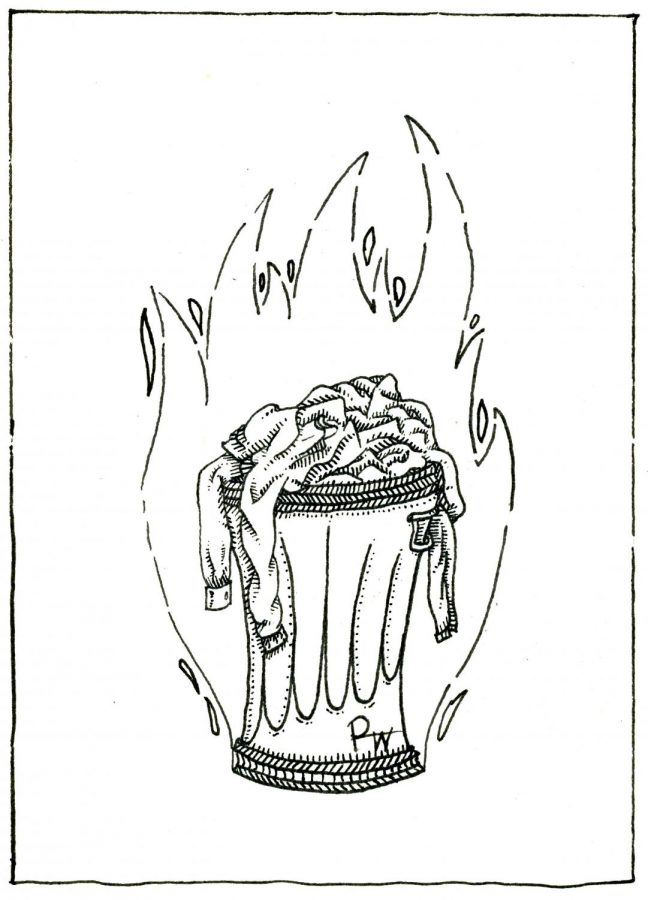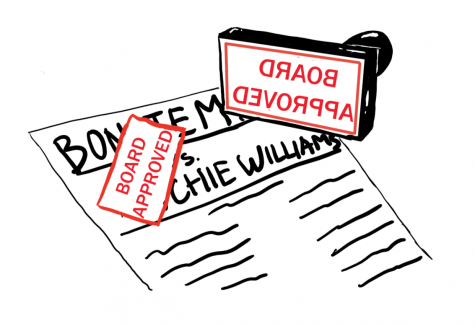Fast fashion accelerating climate disaster
Original drawing by Pace Buchan shows a trash can of burning clothes, representing the anti-fast fashion opinion of the author
People all over the world claim to be amending their lives to save the environment, but many are overlooking the source of much of the world’s pollution: the fashion industry.
Companies that manufacture cheap clothes to follow popular fashion trends like Forever 21, Zaful, and H&M, produce clothes in an unethical manner and cause excessive damage to the environment. The fashion industry is the second most polluting industry in the world, according to the New York Times. The power is in the consumer’s hands to shop at more sustainable brands that lessen the damage to the environment.
Fast fashion is a practice within the fashion industry that describes companies that produce cheap clothes of low quality that follow the most popular trends. Clothes from these outlets quickly wear out and go out of style. When this happens, the customer often goes back to the store to replace their outdated fashion.
Prices at fast fashion outlets may be cheap when the clothes are initially purchased, but the cost adds up when shopping monthly. Buying pricier but higher quality clothes from sustainable stores eliminate the need for frequent shopping because the clothes last longer. Shopping sustainably, then, is also ethical because it decreases the harm to the environment.
The process in which fast fashion companies produce their clothes is destroying effects on the environment. Dyeing textiles is a wasteful process, sometimes using over 2,000 gallons of water to dye the average pair of jeans. Fast fashion companies must save money on production so they can keep prices low, and dye jeans for the lowest cost possible, even if it means squandering thousands of gallons of water.
Furthermore, every day, the fossil fuels burned to power the processing of fabric causes pollution to our waterways and air. According to Forbes Magazine, “Nearly 70 million barrels of oil are used each year to make the world’s polyester fiber, which is now the most commonly used fiber in our clothing. But it takes more than 200 years to decompose.”
In addition to the environmental impact, fast fashion companies go to extreme lengths to keep production costs low, sometimes turning to unethical production methods. To produce fabric and clothing, the fast fashion companies rely upon huge factories, often in developing countries, that employ impoverished people for less than a living wage. According to Oxfam International, a charitable organization working to solve worldwide poverty, “Nine out of ten workers interviewed in Bangladesh cannot afford enough food for themselves and their families, forcing them to regularly skip meals and eat inadequately, or go into debt.”
If a shirt costs $19.99 at Forever 21, the person who sewed it likely made 19 cents for a full day of work, often in unsafe conditions.
In April 2013, a building in Dhaka, Bangladesh that housed five garment factories collapsed, killing over 1,300 people and injuring another 2,500. The workers in those factories produced clothes for Walmart, Prada, and Gucci. The companies that own such factories violate basic labor conditions, allowing thousands of laborers to work in unsafe environments. Even in the United States, which has traditionally been the vanguard of safe labor practices, sweatshops hide behind closed doors. According to the Department of Labor, 50% of American garment factories defy at least two basic labor laws.
And buying clothes from fast fashion brands feeds this epidemic.
The fast fashion industry perpetuates this cycle of injustice and environmental damage. However, as consumers, we have the power to stop giving money to these brands. If consumers stop buying, companies will stop producing.
Right now, we ignore this problem as if it doesn’t affect us, even as fast fashion is destroying our planet. Young people everywhere need to be the generation that causes real change.
We need to take action; we need to start doing and changing. Even the little changes help. Don’t buy that four dollar shirt on Zaful, even though it’s such a good deal. Find out where your clothes come from. Find a store that is eco-friendly, like Alternative Apparel, Reformation, Amour Vert, or go thrift shopping at Goodwill. Spend your money responsibly.
These changes are small, but think about what would happen if everybody spent their money with the greater good in mind. We have the power to end the fast fashion industry and bring relief to both the environment and sweatshop workers.

Alice is a senior, starting her fourth year in journalism. She enjoys hanging out with her friends and her plants, and rewatching Parks and Recreation....








